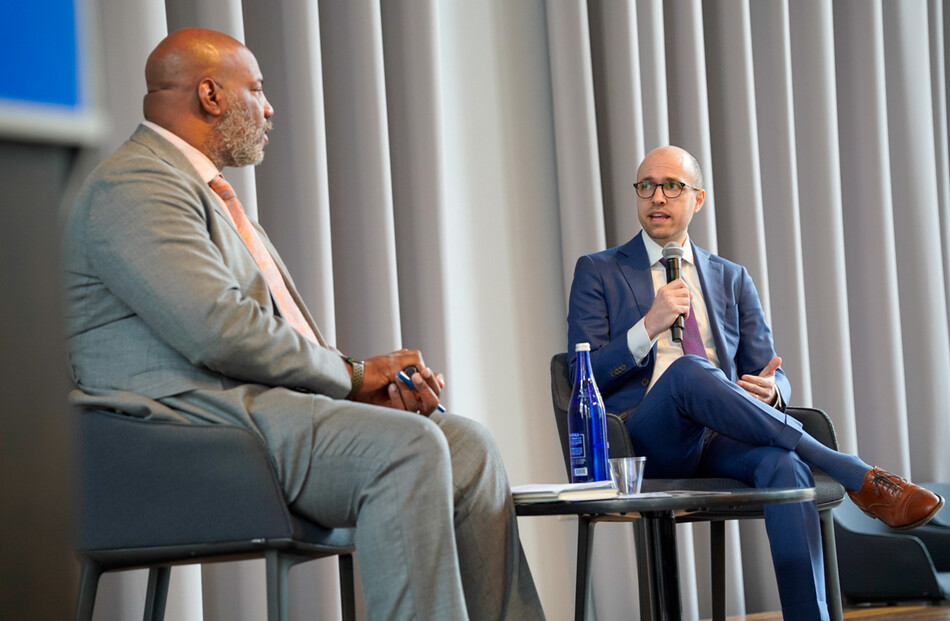In the fall of 2016, three weeks after A. G. Sulzberger was named deputy publisher of The New York Times, Donald Trump was elected president. As Sulzberger, now forty-five and chairman and publisher of the Times, told Columbia Journalism School dean Jelani Cobb at a recent talk in Pulitzer Hall, Trump’s first election announced “an entirely new challenge for the industry, which is the most direct attack on the legitimacy, the rights, and the safety of journalists that we’ve seen in many generations.”
Sulzberger’s appearance at Columbia was part of an event called The Fight for Global Press Freedom, hosted by the J-school and the Times. Inspired by Sulzberger’s Washington Post opinion piece in September 2024, which warned of potential dangers to press freedom in the US, the event featured journalists Juliana Dal Piva of Brazil, András Pethő of Hungary, and Siddharth Varadarajan of India, as well as Bruce Brown, president of the Reporters Committee for Freedom of the Press, and Columbia Journalism School professors Sheila Coronel, director of the Toni Stabile Center for Investigative Journalism, and Azmat Khan, director of the Simon and June Li Center for Global Journalism.
Recounting the evolution of the president’s verbal attacks on his newspaper, from “the failing New York Times” to “fake news” to “enemy of the people” (“a pretty big step,” said Sulzberger, because “what is a president expected to do with the nation’s enemies? Go to war with them. Lock them in jail”) — and given the Justice Department’s seizure of phone and email records belonging to journalists from the Times, The Washington Post, and CNN in Trump’s first term — Sulzberger knew that a second Trump administration might escalate its threats and go after the press “much more directly.”
To prepare, Sulzberger and some of his colleagues interviewed journalists from Hungary, India, Brazil, and Poland — places with a free-press tradition that is being similarly eroded. What Sulzberger found was that the governments of those countries, forgoing the dramatic forms of press repression seen in China (imprisonment) and Russia (assassination), followed “a more technocratic playbook.”
That playbook, said Sulzberger, consists of five steps: one, attack the legitimacy of the press by normalizing harassment, which can lead journalists to self-censor; two, weaponize the legal system by bringing resource-draining lawsuits that force news outlets to weigh the benefits of doing a story against the legal fees it would take to defend it; three, use federal regulators to go after companies that control news organizations; four, downgrade serious news and elevate “journalism that is basically just an extension of a political apparatus”; and five, inspire citizens to carry out acts of intimidation or violence.
“I used to work in a building that did not have bomb-proof bollards, bulletproof doors, armed guards, and safe rooms on every floor,” Sulzberger said. “Today, we have every one of those things.”
One method of defense, Sulzberger suggested, is for press organizations to band together. “When our records were secretly seized,” Sulzberger said, “The Washington Post and CNN immediately reached out to me and said, ‘We’re actually going to the Justice Department to give the attorney general a hard time, to demand answers and to push for reforms.’ Sulzberger also pointed to the Pentagon Papers case of 1971: “When we were shut down from publishing the Pentagon Papers, who picked it up? It was The Washington Post. So the track record of news organizations coming together is really important and must continue.”
When Cobb asked why other news organizations didn’t leave the White House briefing room and Air Force One in solidarity with the Associated Press after Trump restricted AP access for refusing to write “Gulf of America” instead of “Gulf of Mexico,” Sulzberger said that the Times put out a public statement in support of the AP. He then asked the audience to consider what things might look like if the Times, NBC, the Post, and others stepped aside, leaving Newsmax, Breitbart News, and The Daily Wire to fill the void.
Yet despite the harsh headwinds, Sulzberger noted, the American press has, in fact, been producing breaking-news stories and investigations at a dizzying pace. “I think there’s a lot of great journalism being done in this country right now,” he said, “and it’s part of why I think we should plan and we should be prepared. We should not panic. We should keep doing what we’re doing.”



